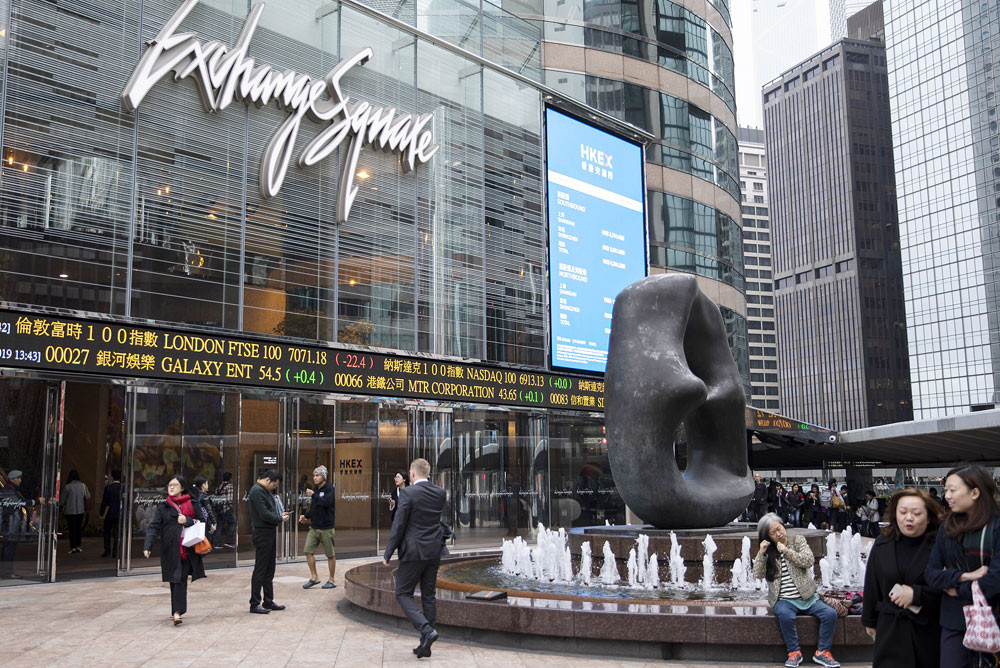Popular Reads
Top Results
Can't find what you're looking for?
View all search resultsPopular Reads
Top Results
Can't find what you're looking for?
View all search resultsAs Suga heads to US, Japanese stocks with ties to China take a beating
Shippers, retailers and manufacturers of various machines and components with significant dependence on Chinese demand could bear the brunt of further diplomatic tension in the form of trade restrictions or popular boycotts, analysts said.
Change text size
Gift Premium Articles
to Anyone
 Pedestrians pass an electronic ticker board and a screen displaying stock figures outside the Exchange Square complex, which houses the Hong Kong Stock Exchange, in Hong Kong, China, on Monday. The bullish mood building in China’s equity market is entering a new phase, with investors flocking to riskier stocks as trading reopened on Monday. (Bloomberg/Justin Chin)
Pedestrians pass an electronic ticker board and a screen displaying stock figures outside the Exchange Square complex, which houses the Hong Kong Stock Exchange, in Hong Kong, China, on Monday. The bullish mood building in China’s equity market is entering a new phase, with investors flocking to riskier stocks as trading reopened on Monday. (Bloomberg/Justin Chin)
J
apanese firms with strong Chinese ties are seeing their shares fall ahead of a meeting of Prime Minister Yoshihide Suga and US President Joe Biden, as investors fear pressure to align Japan more closely with Washington's tough stance on Beijing.
Shippers, retailers and manufacturers of various machines and components with significant dependence on Chinese demand could bear the brunt of further diplomatic tension in the form of trade restrictions or popular boycotts, analysts said.
Suga will on Friday become the first foreign leader to visit the White House since Biden took office in January, widely seen as an indication by both countries as a desire to revitalise their alliance to counter China's growing clout.
"Suga may be asked to come in step with Washington's hard-line stance on China, which could worsen Sino-Japanese relations," Daiwa Securities' Chief Technical Analyst Eiji Kinouchi said.
Given Japan's proximity to China, both geographically and economically, any negative impact from worsening relations would be greater on Japan than on Western allies, Kinouchi said.
Japan has taken a softer approach to China, its largest trade partner, on issues as varied as trade and the origins of COVID-19 that have put the world's most populous country at loggerheads with the United States and its allies.
It stayed out of the West's coordinated sanctions on Chinese officials last month related to alleged human rights abuses in China's Xinjiang, which China has denied.
A senior Biden administration official also said Taiwan and preserving the status quo across the Taiwan Strait would be part of the United States' upcoming talks with Japan.
"Suga will probably get more vaccines from the US In return, he will likely be pressed to get tough on China. So shares of companies with high exposure to China are now capped," said Arihiro Nagata, general manager of global investment at Sumitomo Mitsui Bank.
Retaliation Fears
Hiromichi Shirakawa, vice chairman and chief economist for Japan at Credit Suisse, said concerns about Suga's visit were weighing on the entire Japanese stock market. "The Nikkei has been capped below 30,000 and that certainly reflect some such concerns."
Investors fear any shift by Japan to a more hardline stance on contentious issues could prompt Chinese retaliation, official or otherwise, against Japanese interests, analysts said.
The stock price index of Japanese shippers, for whom Chinese demand is widely considered vital, has fallen 5.8 percent so far this week, versus a 0.4 percent fall in the broader Nikkei.
Some electronic components makers that had benefited from a global chip shortage have also fallen out of investors' favour.
TDK Corp, which sells over half of its products to China, lost 6.6 percent this week. Among others with high Chinese exposure, Taiyo Yuden fell 6.6 percent and Nitto Denko Corp shed 2.6 percent.
Yaskawa Electric Corp's fairly upbeat earnings on Monday failed to prevent its stock from falling. Its figures showed China accounted for a quarter of its sales in the last financial year, versus 19 percent a year earlier.
In retail, the owner of household goods and clothing chain Muji, Ryohin Keikaku Co Ltd, suffered a backlash from Chinese netizens last month when it said it was "deeply concerned" about reports of forced labour in Xinjiang.
On Wednesday, it said a third-party auditor found no grave breaches of any rules at its Xinjiang organic cotton field. Its stock fell 4.8 percent on Thursday and is down as much this week.
Fast Retailing, owner of the Uniqlo casual clothing chain - which has a big presence on Chinese high streets - saw its stock fall heavily on Monday.
The China branch of the cotton trade body Better Cotton Initiative said last month it had not found signs of forced labour related to cotton production in Xinjiang.









